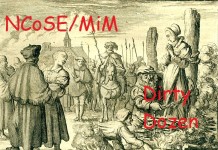 If you’ve never read a book specifically in celebration of Banned Books Week, you might want to consider rectifying that situation this Sunday, September 30, when the 30th anniversary of the proud literary tradition officially kicks off.
If you’ve never read a book specifically in celebration of Banned Books Week, you might want to consider rectifying that situation this Sunday, September 30, when the 30th anniversary of the proud literary tradition officially kicks off.
I can still remember (more or less) when I first learned about Banned Books Week: I was probably 11 or 12—Isaac Asimov and the Readers’ Guide to Periodical Literature were my big obsessions at the time. A Banned Books Week poster was hanging on the wall outside my elementary school’s library, and next to it was a glass case with shelves inside, and stacked on the shelves, of course, was a selection of once-banned books.
The Adventure of Tom Sawyer and Animal Farm both caught my eye. Naturally, I checked them out of the library immediately and devoured them both. A few years after reading Animal Farm, I moved on to 1984, which to this day remains one of the most personally influential books I’ve ever read.
As it happens, Banned Books Week has grown into something of a cottage industry for the ALA. Head on over to the ALA’s BBW website, and you’ll find everything from T-shirts and bookmarks to a press kit, a calendar of upcoming BBW events and a video essay featuring journalist Bill Moyers, the honorary co-chair of BBW 2012.
If you’re interested in learning more about why a particular book was banned …
◊ You can pick up the latest edition of the Banned Books Week Resource Guide. It’s updated every three years, and you should be able to find a copy at your local library.
◊ You can visit the ALA’s Banned and Challenged Classics page.
◊ You can check out the BBW’s Free Downloads page, where you’ll find the last seven years worth of brochures featuring banned or challenged books, all of which are downloadable as PDFs.
{Video} What banned book are you reading?


































I work at Boxford Library and we made a video for Banned Books Week! We were all shocked to learn about what books had been banned and why. “Where the Sidewalk Ends” was apparently challenged more than once because one poem talks about breaking plates rather than washing them!
Here’s our video: